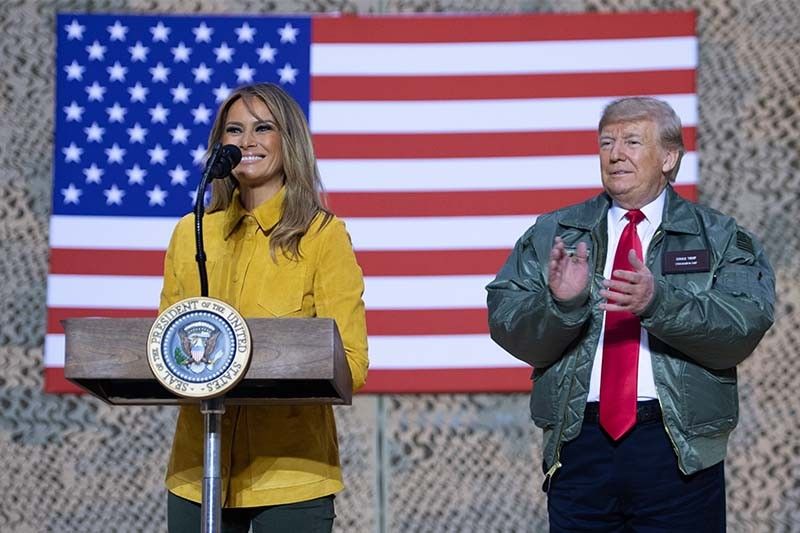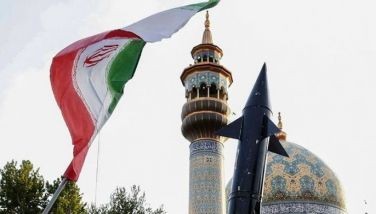Iran and the US: Months of escalating tensions

TEHRAN, Iran — Tensions between Iran and the United States have been steadily escalating for months. After a US strike killed a top Iranian commander last week and Iran launched retaliation strikes on Wednesday, here is a review:
Terror blacklist -
On April 8, 2019 Washington declares Iran's elite Revolutionary Guard Corps a "terrorist" group. Its Quds Force, which operates abroad, is also put on the blacklist.
On May 5, White House national security adviser John Bolton announces the deployment of an aircraft carrier and a bomber task force to the Middle East.
Nuclear accord unravels
On May 8, a year after Washington unilaterally withdrew from an international 2015 deal curbing Iran's nuclear programme and reimposed sanctions, Tehran warns it is prepared to resume nuclear activity.
Trump announces new measures against Iran's steel and mining sectors.
Attacks on ships
On May 12, four ships, including three oil tankers, are damaged in mysterious attacks in the Gulf that the United States blames on Iran.
On May 25, the United States says it is deploying 1,500 additional troops to the Middle East to counter "credible threats" from Iran.
Two tankers, Norwegian and Japanese, come under attack in the Gulf of Oman on June 13. Washington, London and Riyadh blame Iran, which denies involvement.
US drone shot down
Iran's Revolutionary Guard says on June 20 it shot down a US drone that violated Iranian airspace near the Strait of Hormuz.
Trump approves a retaliatory strike, but cancels it at the last minute.
On June 24, Trump announces "hard-hitting" financial sanctions on Iran's supreme leader Ayatollah Ali Khamenei and senior Iranian military leaders.
On July 18, Trump says the US military took down an Iranian drone that came dangerously close to one of its naval vessels in the Strait of Hormuz.
On July 1, Iran announces it has breached a cap on its uranium enrichment set out in the 2015 deal.
Saudi oil attack
On September 14, aerial attacks claimed by Yemen's Iran-backed Huthi rebels spark fires at two major Saudi oil facilities.
Tehran is accused by the United States and other powers of being responsible but denies involvement.
On September 20, Trump announces "the highest sanctions ever imposed on a country", hitting Iran's central bank.
On November 7, Tehran resumes uranium enrichment at its underground Fordo plant -- its fourth walk-back from the 2015 nuclear accord.
US backs protesters
Iran is furious when the US expresses support for protesters who take to the streets on November 15 after a fuel price hike.
The White House condemns Iran for using "lethal force" in the days of violence, which reportedly leaves scores dead. Iran's foreign ministry criticises "American economic terrorism".
US strike kills commander
On December 29, the United States carries out air strikes against bases of a pro-Iran group in Iraq, killing at least 25 fighters.
The strikes are in retaliation for rocket attacks against US interests in Iraq, including one in which a US civilian contractor is killed on December 27.
On December 31, pro-Iran protesters storm the US embassy compound in Baghdad expressing fury over the strikes. Trump warns Tehran it could "pay a very big price".
On January 3, 2020 a US strike kills top Iranian commander Qasem Soleimani, the Quds Force commander, in Iraq.
The Pentagon says Trump ordered the killing after the siege of the US embassy in Baghdad.
Iran responds with missiles
At Soleimani's funeral on January 7, top Revolutionary Guards commander Major General Hossein Salami said Iran would "take revenge".
On January 8, Iran fires missiles at two Iraqi bases used by the US military. There are no immediate reports of casualties.
Iran Foreign Minister Javad Zarif says the nation "took and concluded proportionate measures" in self-defence.
- Latest
- Trending



































